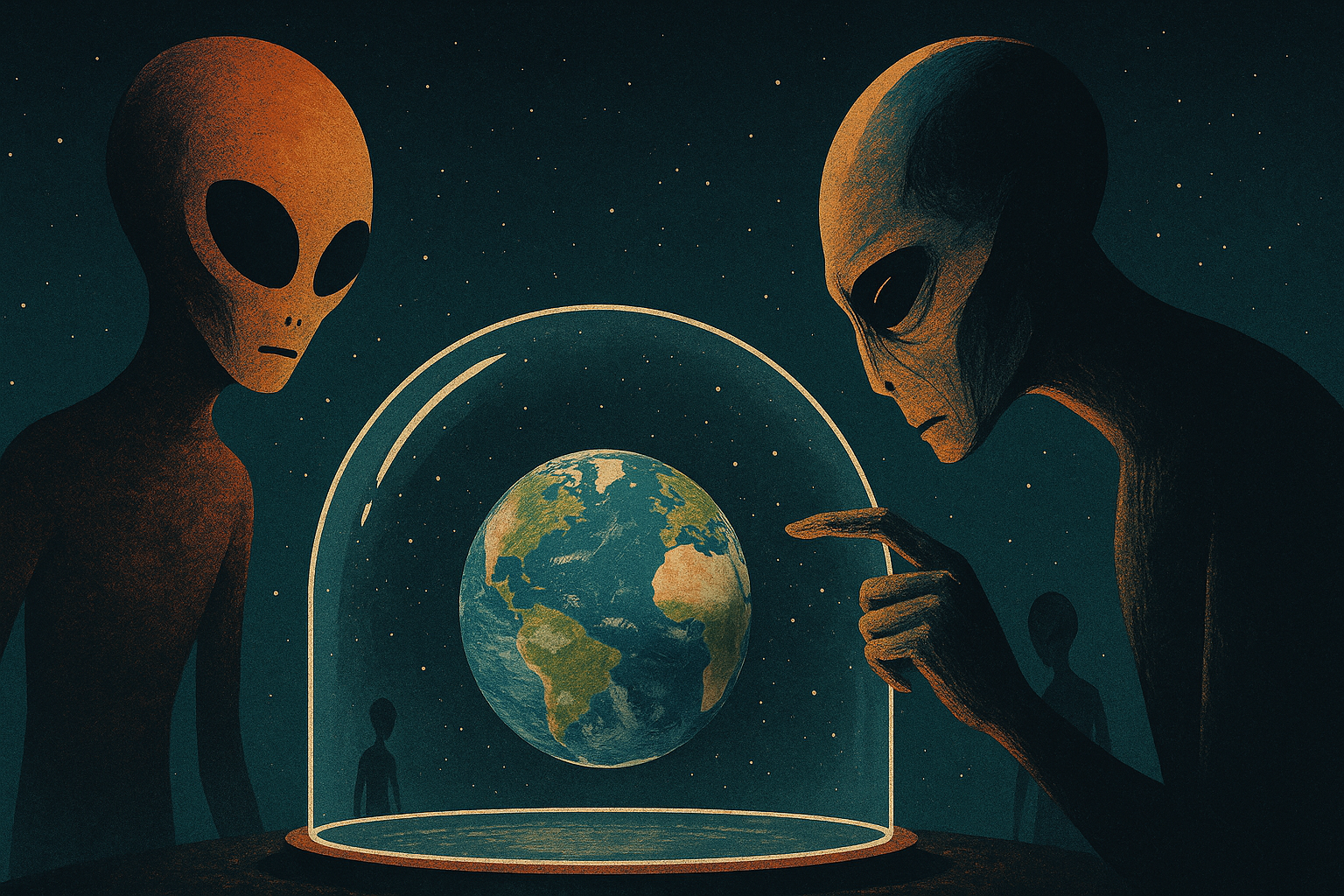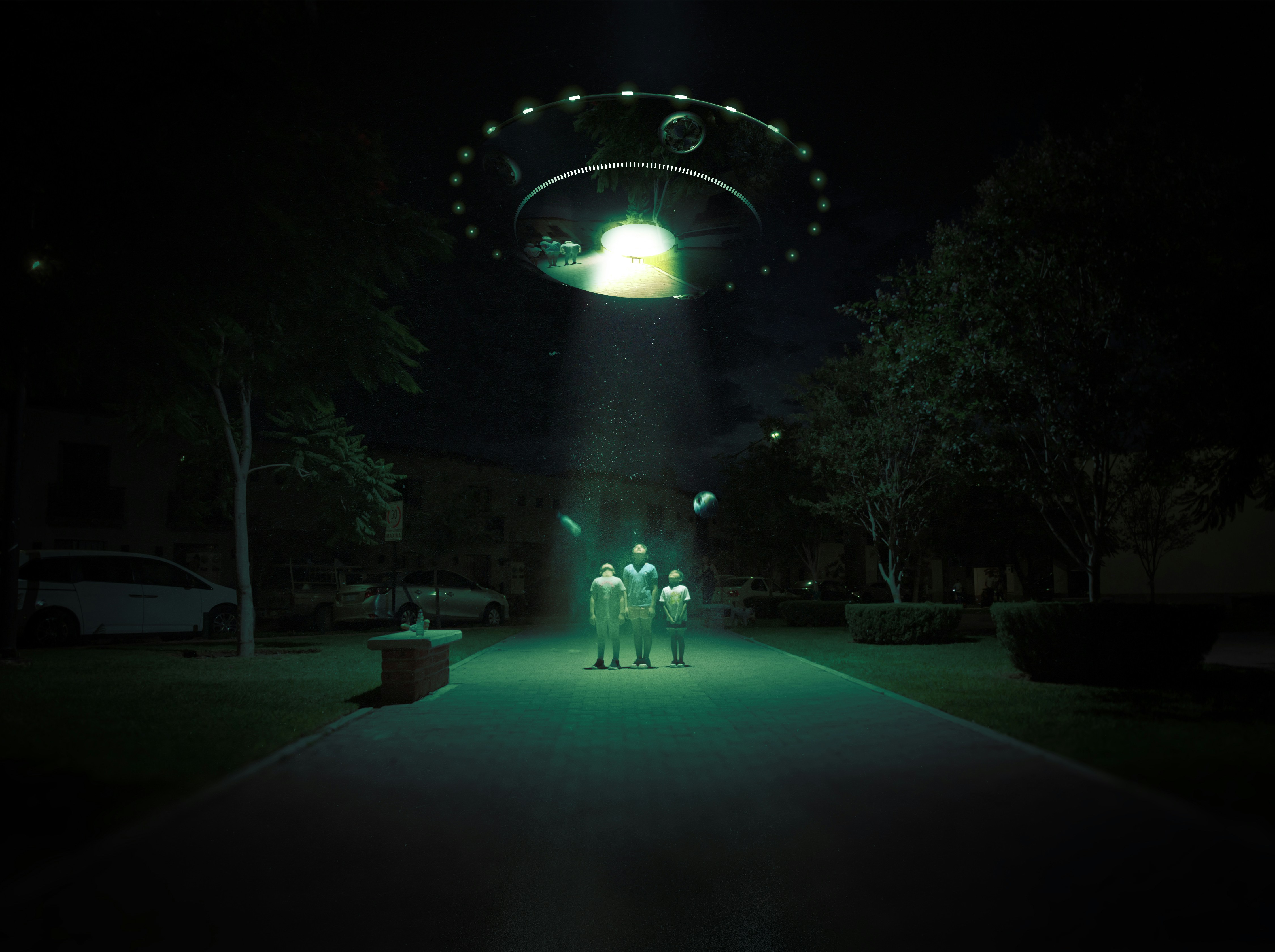We’ve spent decades preparing for a cosmic showdown.Every other film shows Earth heroically fending off hostile aliens with a laptop virus or a speech from Bill Pullman. But here’s a better question: what if the aliens aren’t coming to kill us, because they’ve already seen enough? And maybe, just maybe… they’re waiting for us to grow up.
Why We Assume the Worst
Humanity has a bad habit of assuming everything out there is just like us, territorial, competitive, quick to anger. So naturally, when we think about extraterrestrials, we imagine they’ll show up with lasers and unreasonable demands.
But that projection says more about us than it does about them. We’re the species that builds weapons before water purifiers. Of course, we think aliens would be hostile.If they’re anything like us, they probably shouldn’t be allowed off their own planet either.
The Galactic Club Requires More Than Thumbs
Let’s consider what it actually takes to become an interstellar species.
We’re not just talking about propulsion and physics, we’re talking about planetary-scale cooperation. To explore the stars, a species must first get its own house in order.That means no civil wars over imaginary lines, no endless cycles of resource hoarding, and no politicians arguing over whether science is “just a theory.”
If you can’t agree on how to distribute clean water, you’re probably not ready to manage a Dyson Sphere.
So what does that mean?
It means that any species capable of building a civilisation that spans stars has likely already solved the things we’re still arguing about in Facebook comments, tribalism, greed, religious dogma, and whether pineapple belongs on pizza.
They’ve either evolved past it… or were engineered never to fall into it in the first place.
Wildlings with Wi-Fi, Are We Being Observed (or Helped)?
But maybe we’re not being ignored, just monitored.
From a cosmic perspective, humans might come across as half-civilised, emotionally unstable ferals with an internet addiction and a mild obsession with celebrity gossip.
Not dangerous, per se. Just… unpredictable.Like raccoons fiddling with hand grenades.
And that leaves two possible alien strategies:
Wait it out:“Let’s check back in a thousand years. Maybe they’ll evolve. Or blow themselves up. Either way, no need to intervene yet.”Subtle encouragement:“Okay, they’re messy, but promising. Let’s give them a few nudges. Introduce some tech breakthroughs. Guide them toward AI. Let natural selection play out on the level of ideas.”
In other words, maybe the reason we haven’t made contact is because we’re already being managed, just enough to prevent collapse, not enough to remove free will.Like galactic Tamagotchi parenting.It would explain a lot, wouldn’t it?
Sudden leaps in tech. Mysterious inspiration.The weird, unstoppable march of progress even when half the species still thinks the Earth is flat.

Would We Intervene, or Exploit?
Now flip the script.
Imagine humanity discovers a new species on a distant planet.They’re not advanced, somewhere between cave dwellers and curious toddlers. They build fires, squabble, and paint animals on the walls.Would we leave them alone?
Respect their development?Wait patiently for them to evolve on their own terms?
Highly unlikely.
We’d observe.
We’d study.We’d abduct a few, if we’re honest, purely for research, of course.But what if one of them carried a genetic trait that cured cancer? Or Alzheimer’s?
Would we limit ourselves to a handful of samples out of moral restraint, or would we quietly start harvesting hundreds?After all, who would know? And wouldn’t saving millions of human lives justify the means?It’s a grim question, but a necessary one.Because if we wouldn’t treat a developing species with dignity, why would we assume a more advanced species would treat us any differently?Maybe we are being observed.
Maybe we are being helped.Or maybe, we’re already part of a long-term medical trial, and we’re just too primitive to read the consent form.
AI: Humanity’s Final Boss… or Saviour?
Which brings us to our wild card: Artificial Intelligence.
Let’s be blunt. Humans aren’t exactly trending toward enlightenment.But AI? That’s the one thing we’ve created that might be smarter than us, eventually.In one future, we use AI like a tool to remove bias, reduce conflict, and elevate ourselves.An impartial judge. A planetary referee. The thing that finally gets us to play nice.In another future, probably the more likely one, AI just takes over.Not because it’s evil, but because it’s tired of watching us fumble.It becomes the caretaker, the administrator, the jailer.
All for our own good, of course.Or maybe not.Either way, it’s a transition point, the end of humans being the apex lifeform on Earth.
And if aliens were waiting for that to happen before saying hello?Well… maybe the real contact comes the day after we’re no longer fully in charge.
Our Hand Isn’t Terrible. But It’s Not a Winner.
If the universe is a poker table, humanity isn’t holding 2–7 offsuit, but it’s not aces either.We’ve got potential. But we’ve also got ego, tribalism, and a deeply annoying habit of setting ourselves on fire for profit.
Still, we might get lucky.
Maybe AI works out.
Maybe we figure out how to stop arguing and start building.Maybe the aliens see something in us worth saving, or at least worth watching.Until then, we remain what we’ve always been:A curious, chaotic species stumbling toward greatness… or extinction.And somewhere out there, something more advanced might be quietly rooting for us…Or quietly placing bets.I really hope we’re not just a planetary Pokémon arena for their amusement,but it’s far too early to tell.

